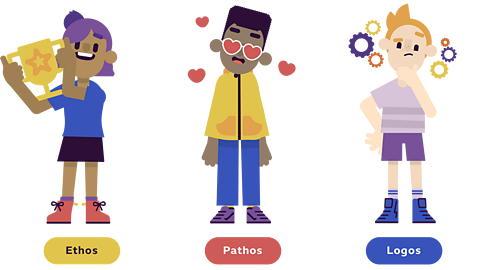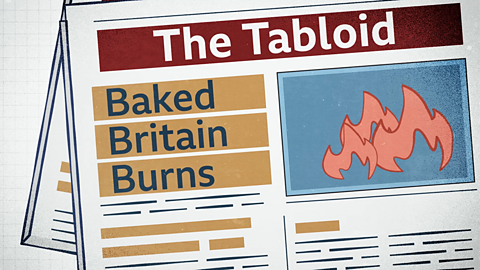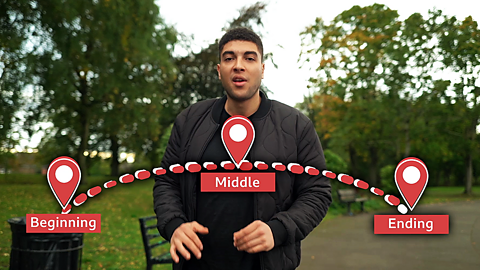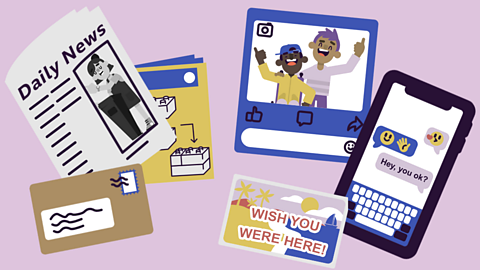What do you know?
How is persuasion like a bar of chocolate?
- The word persuade is made up of the prefix āperā, which means āthoroughlyā.
- The root word āsuadereā is Old French but the original root of āsuadereā comes from the word āswadā and means āsweetā.
- So persuade technically means to make something thoroughly sweet!
Introduction to writing to persuade
Persuasion is one of the most important skills you will need in life ā it could help you to find a job, seize a new opportunity or just grab a bargain.
Key learning points
- Find out how to persuade and look at how we are persuaded.
- Explore how language can be used to persuade.
- Discover persuasive devices.
Video about writing to persuade
A video about the different techniques you can use when writing to persuade
When you write to persuade, you are trying to change peopleās minds, convince readers of a particular viewpoint or make an argument more compelling.
Iāve written this letter to persuade people that they should always avoid the cracks in the pavement. Ready?
Start with a clear opening statement.
Everyone knows that stepping on cracks in the pavement brings bad luck.
Use a rhetorical question.
Is it not our duty, therefore, as good citizens, to avoid doing so whenever possible?
Use statistics.
Last Tuesday, I counted eight out of ten passers-by stepping on the cracks in this very pavement and then, in the evening, it rained!
Use anaphora and the rule of three.
Some say that avoiding the cracks is not linked to the weather.
Some say that avoiding the cracks to prevent bad luck is unscientific.
Some say that avoiding the cracks is mere superstition.
Be direct.
To those people I say, you could not be more wrong.
Use emotive language.
Consider the many who are forced to remain indoors due to the rain, and itās all due to just a few unkind ā no, cruel, crack-steppers, who wilfully refuse to make this one small change.
Use dramatic imagery and alliteration.
Itās due to these people that the dark and despairing downpour drives us all indoors, despondent and drenched from the deluge of rain.
End on a call to action.
Is avoiding cracks hard to do? If not, then for the small amount of effort required, just avoid those cracks!
And make it memorable.
So, remember, next time you go for a walk down the streets, avoid cracks on the ground to keep the sunshine around!
Erm, did you put a stamp on that?
What is persuasion?
The word persuade literally means to āthoroughly sweeten.ā
This is a great metaphor for the action of persuasion ā when you persuade someone you try and make whatever it is you want seem extremely desirable. You might also āsugar-coatā your words, meaning you use sweet words and sentiments to make your argument even more persuasive. We use persuasion all the time, sometimes without even realising.
Persuasion can be used for different reasons but the most common are:
- to change someoneās mind
- to change someoneās actions
- to change someoneās feelings
When, where and how are we persuaded?
In the modern world, we are constantly being persuaded in one way or another. We are persuaded to do, think, or feel differently every day by media, family, and friends.
Learning how persuasion works can help you to be more in control of the decisions you make.
Advertising
Advertising is everywhere: on our phones, on our television, on billboards, on public transport, in magazines and newspapers, on sports kits, and even on notes delivered through our doors.
How do adverts persuade us?
Adverts can teach us a lot about how to persuade someone. The word advert comes from the prefix āadā meaning towards, and the root verb āvertereā meaning āto turn.ā An advert is all about making us stop and look, to turn towards it and buy what it offers.
Adverts persuade using three main techniques:
- Information, facts and statistics: āSince 2004, our brand has been the most popular brand on the market.ā
- Anecdote (a story or narrative): āUsing this brand changed my lifeā or a depiction of someone fictional.
- Repetition: Slogans, repetition of key phrases such as āthis is not just ordinary foodā¦ā
How can language be persuasive?
Language, used carefully, can be incredibly persuasive.
The three appeals
Aristotle was a Greek philosopher who wrote about the art of using language to influence others. In his studies, he explained the importance of using three appeals to persuade anybody to do anything.
An appeal, just like a charity appeal, is a serious or heartfelt request aimed at someone else.

Ethos - Values
Ethos is about getting people to trust you ā show the people that you share the same values as them. Show them that you understand their perspective.
Pathos - Emotions
Pathos is about appealing to the emotions of others ā use language to make people feel a certain way, whether it be angry, guilty, encouraged or fearful.
Logos - Logic and sense
Logos is about using logic or evidence to appeal to the common sense of others ā showing that you are basing your opinions on facts.
Persuasive devices for writing
There are many persuasive devices you can use to strengthen your point. A great way to remember them is by using the mnemonicA pattern of letters, words, ideas or associations which help with memorising something. PERSUADER.
- Pronouns
- Emotive Language
- Repetition
- Statistics
- Undermining the opposition
- Anecdote
- Direct address
- Exaggeration
- Rhetorical questions
Click on each letter in the image below to learn more.
More persuasive devices
Anaphora is the repetition of the same words at the start of successive sentences or clauseA group of words including a subject and verb which together form a sentence.. This helps emphasise the point to the audience through the repetition and links to different ideas.
Epistrophe is the repetition of the same words at the end of successive sentences or clauses. This does the same job as anaphora, but the repetition at the end leaves key words and concepts fresh in the minds of the audience.
Hypophora is the name of the technique when you answer your own rhetorical questionA question that doesn't need an answer and is asked for dramatic effect or to make a point.. This is effective because it leads the audience to your way of thinking. Asking a rhetorical question is risky as the audience might not answer in their heads the way you wish them to; hypophora does the job for them.
An example of hypophora can be found in the childrenās TV show Bob the Builder. When the theme tune asks āCan we fix it?ā the response is immediate āYes we can.ā There is no doubt allowed about Bob's abilities!

Read this extract from The Merchant Of Venice by William Shakespeare:
BASSANIO:
Sweet Portia,
If you did know to whom I gave the ring,
If you did know for whom I gave the ring,
And would conceive for what I gave the ring,
And how unwillingly I left the ring
When naught would be accepted but the ring,
You would abate the strength of your displeasure.
PORTIA:
If you had known the virtue of the ring,
Or half her worthiness that gave the ring,
Or your own honour to contain the ring,
You would not then have parted with the ring.
Where does Shakespeare use epistrophe?
Shakespeare uses epistrophe on the word āringā.
Bassanio promised Portia that he would not give away his wedding ring, but she has tricked him while wearing a disguise. Bassanio uses epistrophe to argue his case and convince Portia that he had no choice:
If you did know to whom I gave the ring,
If you did know for whom I gave the ring
Portia in turn uses epistrophe to stress the importance of the ring, and show how Bassanio has betrayed her trust:
If you had known the virtue of the ring,
Or half her worthiness that gave the ring
Test your knowledge
Play Bitesize secondary games. gamePlay Bitesize secondary games
Have fun playing science, maths, history, geography and language games.

More on Non-fiction writing
Find out more by working through a topic
- count4 of 10

- count5 of 10

- count6 of 10

- count7 of 10
